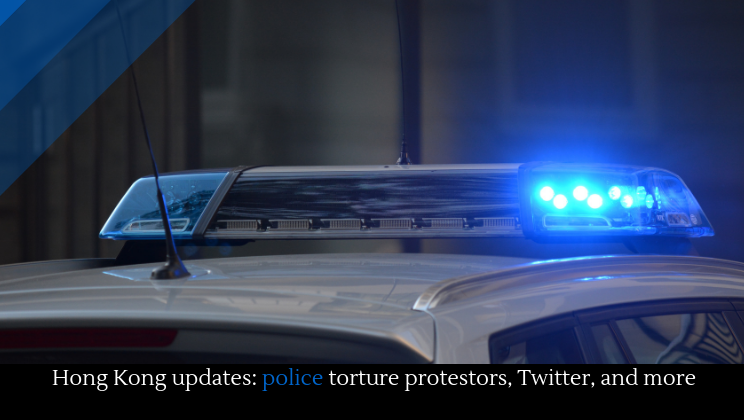Hong Kong updates: police torture protestors, Twitter, and more
Posted by Annie May / August 21, 2019
Hong Kong Legislative Council Member Lam Cheuk Ting has produced video evidence of police torturing a protestor. The video shows police officers abusing an elderly man––slapping him, poking his eyes, bending his fingers back, humiliating him, and so on.
Twitter has shut down 200,000 Chinese accounts for spreading disinformation about the protests. It will also ban ads from Chinese government-backed media companies. Facebook has done nothing to stop the spread of disinformation or to ban state-backed ads.
Hong Kong’s super rich are calling for an end to protests––because, of course, the protests are hurting their bottom line. Together, the ten wealthiest tycoons have lost billions of dollars.
The Chinese media has said that Hong Kong protestors are “asking for self-destruction.” They also released a video of the Chinese military amassing near the city’s border. Although the protestors have abandoned the airport after occupying it over the weekend, they are continuing protests throughout the city.
The protestors claims that they’re fighting against authoritarianism is bolstered by one of the key weapons: laser pointers. The laser pointers do a number of things. When shined in the face of police officers, they deter them, for example. But much more importantly, the laser pointers scramble cameras and, as a result, prevent photographs and (much more importantly) deter the use of facial recognition software. Such a weapon will halt Beijing’s use of technology to control its population.
Last week, protestors, all clad in black, have occupied Hong Kong’s international airport. The protestors plan to occupy the airport until Sunday as a protest against Chinese authoritarian government. They handed out pamphlets that read, “You’ve arrived in a broken, torn-apart city, not the one you have once pictured. Yet for this Hong Kong, we fight. We shall never surrender.”
Protests began earlier this summer when China wanted the ability to extradite from Hong Kong to mainland China. Those plans were quickly paused, but the protests continued. Protestors were no longer concerned with the extradition from Hong Kong––instead, they were demanding wider democratic reforms.
More news.
Comments are off for this post.